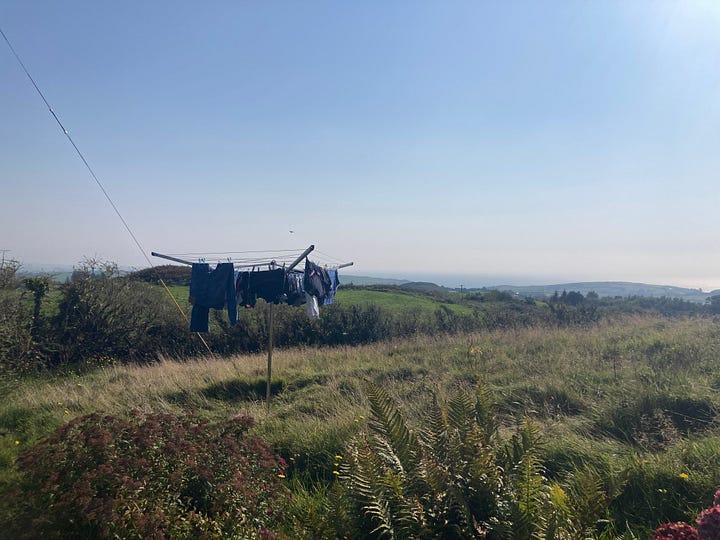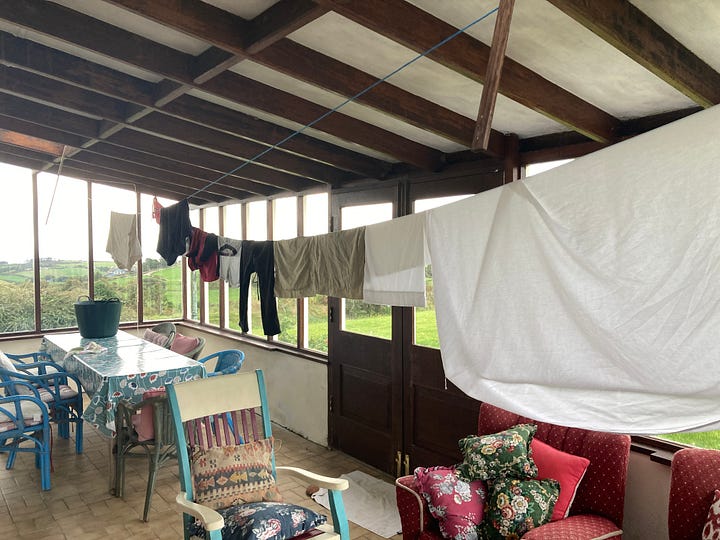This voyage I am on is literally a voyage (on the sea; love that part), but also a voyage of exploration—a search for a different way to live on a rapidly changing planet that is more in balance with the natural world, and better mitigates the ongoing damage we are doing to the atmosphere, terrestrial ecosystems, the oceans, and other species.
Some people find it easy to dismiss this effort at lifestyle exploration and reinvention by telling me “Well, not everyone can live on a boat.” That is true. But a boat is a choice of where to live (one that particularly suits me), not a choice of how to live. You don’t have to live on a boat to eat a plant-based diet. You don’t have to live on a boat to buy a lot less stuff. You don’t have to live on a boat to ride a bike and walk more, fly less, dry your laundry on a line, or otherwise find ways to reduce your carbon footprint and your impact on the planet. It is these choices that matter at the individual level (diet, reducing food waste, and flying are the three that matter most, in case you are wondering). How individuals vote, and what sort of national leadership follows, is also vital.
Still, while I have been rusticating in Glandore, West Cork, Ireland, I have been thinking more about ways to do land-life differently. I have long been commune-curious because some sort of shared living model has always seemed like a more rewarding and thoughtful way to exist—more fun too—than the predominant and conventional single-family-unit lifestyle. Over the years, friends and family have indulged me in this semi-fantasy, noting promising commune real estate, and engaging in beer-fueled planning of the best structure and organization.
Well, that never happened. But, happily, over the years my generation of friends in Glandore started to speak of Glandore as a sort of commune—there is already plenty of communal potlucking, pubbing, and adventuring—albeit one in which everyone has their own (nearby) dwellings.
Living in separate dwellings probably doesn’t sound very commune-y, but the difficulty of finding privacy or occasional and vital solitude has always been the biggest challenge, to me at least, of a traditional commune lifestyle. Disaggregated commune-ism—if that isn’t an oxymoron—has a certain appeal, even if it is less energy efficient (everything is a trade-off). But there is so much that can be shared and achieved even without living in the same shared space.
I first noted this when Laughing Gull and I were hanging out in Georgetown, in the Exumas, last winter. During the colder months, Georgetown becomes a vast floating community for hundreds of cruisers. Families and couples live aboard their own boats, but the cruising residents of Georgetown foster a remarkable communal spirit. It starts with a friendly and informal morning radio net, by which arrivals are welcomed and departures are bade farewell. The morning net then gets down to community business. It offers the opportunity for cruisers to solicit help with any sort of issue they might be having on their boat, and borrow tools or gear they might need but don’t have onboard. Or share rides to the airport. Community activities, including potlucks, dinghy races, concerts, and volleyball competitions are announced. Free kitesurfing or other lessons are announced. Surplus gear is given away, swapped and sold (which is how I got my excellent blow-up paddleboard). And all of this is reinforced via an active Facebook group.


All in all, it was very impressive. And I was struck by the truly generous lengths cruisers would go to to help one another by sharing spare parts and mechanical know-how, passing on local knowledge, or carrying spare parts and gear to Georgetown for one another. Lots of people were willing to spend their time, and go out of their way, to help someone else. It is one of the things I love about the cruising community, and in Georgetown you could see it happen every day.
It was uplifting, because that sort of enthusiastic community spirit is increasingly rare in an age of polarization and misinformation. Except perhaps in smaller towns and villages where everyone knows everyone, and there is a premium on getting along and helping each other out. Like Glandore.
The Georgetown/Glandore spirit of community is a natural inspiration to join the commune-ist party (not the Red kind, just to be clear, the fun, sharing, social-bonding, kind). This strong commitment to a communal ethos is already deeply embedded in Glandore, deeper than any place I have experienced ashore. And it makes me wonder what I can contribute to fostering and deepening this ethos (apart from looking after my friend Eileen’s backyard chickens this weekend). So while I am here I have been thinking about how I can help make it easier to share tools and know-how, or make it easier to free-cycle anything no longer needed. What about communal purchases of cars (hybrid plug-ins are suitable here)? Or a shared electric lawn mower? Or small boats? Sharing is caring, sure. It is also a smarter way to allocate resources, and reduce consumption and waste. It makes a lot of sense to me, especially if it involves plenty of really good baking (which is a definite feature of commune-ism here in Glandore).


Truly leaning into this shared approach to living will no doubt reveal nuances and flaws. But it can’t hurt to try. And it would be nice to find out whether my long-held instincts about the benefits of communal living are wise, or too utopian. In any case, in the Anthropocene Era there is nothing worse than stasis and the status quo, because the status quo is an ongoing disaster. There is always something useful to be learned in trying something different. Sometimes different is better. Maybe even a lot better.
Weekend Reading:
1) Planetary boundaries are an important way to conceptualize human impact on Earth’s systems. We really, really need to stop pushing through them.
2) A new study analyzes Earth’s climate over the past 485 million years, and documents lots of temperature shifts. So climate change is nothing new? Well, the study finds temperature changing faster now than at any time in half a billion years. And headed to a place humans might not like much:
The study also makes clear that the conditions humans are accustomed to are quite different from those that have dominated our planet’s history. For most of the Phanerozoic, the research suggests, average temperatures have exceeded 71.6 F (22 C), with little or no ice at the poles. Coldhouse climates — including our current one — prevailed just 13 percent of the time.
This is one of the more sobering revelations of the research, Judd said. Life on Earth has endured climates far hotter than the one people are now creating through planet-warming emissions. But humans evolved during the coldest epoch of the Phanerozoic, when global average temperatures were as low as 51.8 F (11 C).
Without rapid action to curb greenhouse gas emissions, scientists say, global temperatures could reach nearly 62.6 F (17 C) by the end of the century — a level not seen in the timeline since the Miocene epoch, more than 5 million years ago.
3) I know I go on and on about the environmental impact of meat and other dietary choices. Thankfully, the New York Times helps me out with a nicely done visual story that adds the environmental costs to the supermarket costs of different foods:
As pricey as a run to the grocery store has become, our grocery bills would be considerably more expensive if environmental costs were included, researchers say. The loss of species as cropland takes over habitat. Groundwater depletion. Greenhouse gases from manure and farm equipment.
For years, economists have been developing a system of “true cost accounting” based on a growing body of evidence about the environmental damage caused by different types of agriculture. Now, emerging research aims to translate this damage to the planet into dollar figures.
By displaying these so-called true prices, sometimes next to retail prices, researchers hope to nudge consumers, businesses, farmers and regulators to factor in the environmental toll of food.
Sooner rather than later would be good.
4) If you are into it, here’s a curated reading list of articles about commune living. And I guess I should leave you with this:
If you liked this post from Sailing Into The Anthropocene, why not subscribe here (free!), and/or hit that share button below? You can also find me on Instagram and Twitter.








